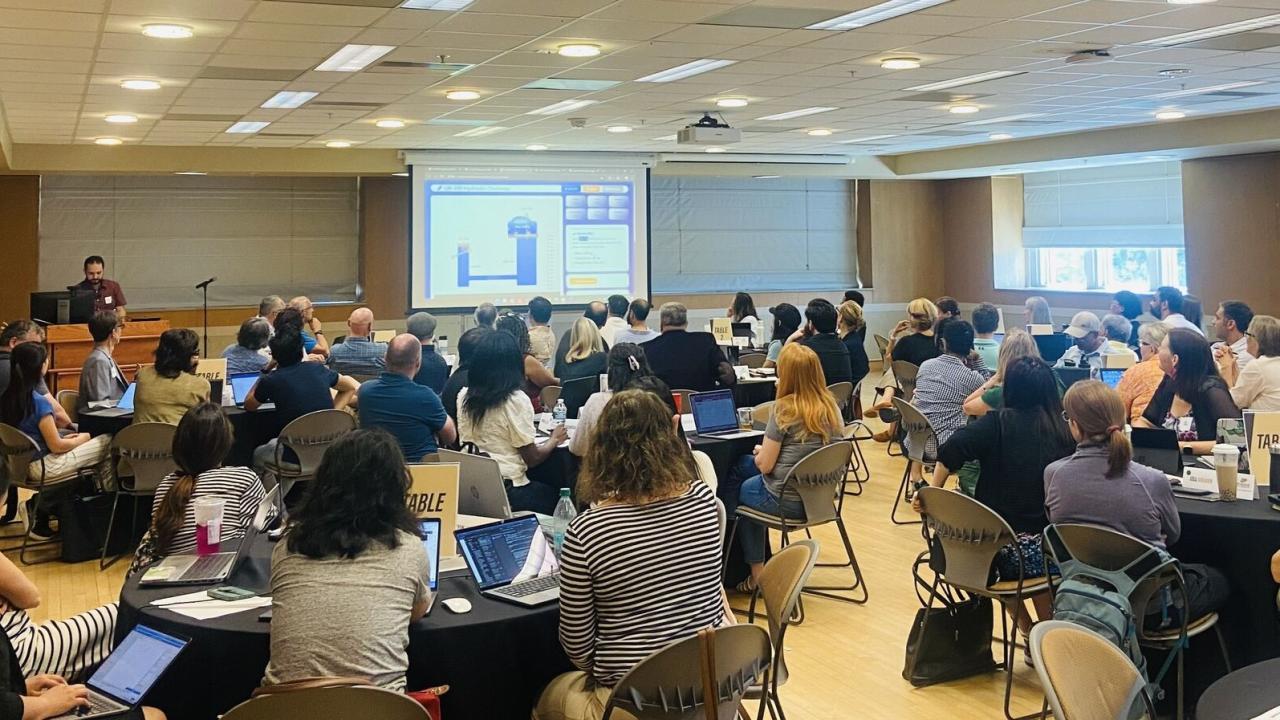Three faculty members from Purdue University’s School of Engineering Technology (SoET)—Rustin Webster, April Cheung, and Farid El Breidi—recently took part in the first Purdue AI Academy, a professional development initiative hosted by the Office of the Provost’s Innovation Hub.
The AI Academy was organized by Innovation Hub experts Beth Fines and David Nelson. It is designed to help faculty and staff integrate artificial intelligence (AI) into teaching, research, and professional practice. Learn more about the program here.
The weeklong Academy combined presentations, workshops, and self-directed exploration, giving participants structured opportunities to experiment with AI tools, reflect on implications for their fields, and design strategies to bring AI into the classroom.
Enhancing student learning and faculty efficiency
For April Cheung, associate department head and associate professor of practice in the SoET, the Academy highlighted how AI can improve both teaching and productivity.
“I’m thrilled by the array of resources available to enhance our job efficiency,” Cheung said. “My primary interest lies in tools that can enhance student learning and boost my productivity. In my conversations with other faculty, I’ve come across two tools that I’m eager to explore this semester.”
Cheung especially valued the chance to collaborate across disciplines.
“I’m deeply grateful for the opportunity to engage in meaningful discussions with other faculty and staff about the use of AI, the exploration of tools, and, most importantly, how they are integrating AI into their classrooms and work. These exchanges are invaluable and have enriched my understanding.”
Embedding AI literacy in first-year courses
Rustin Webster, associate professor of engineering technology, focused on ways to introduce AI to first-year students in TECH12000—Design Thinking in Technology. The course, typically taken in the first semester, covers problem-solving, design thinking, and career readiness.
“The Academy provided me with the knowledge and time to create an engaging and active AI-themed presentation,” Webster said. “Introducing AI early gives students the opportunity to see its relevance and potential impact on their future careers.”
Webster emphasized that the Academy differed from traditional faculty workshops.
“It was a welcoming change to other PD opportunities. First, it focused on an emerging technology that students are already more proficient in than the majority of faculty. Second, the self-exploration time provided me with paid, scheduled time to complete multiple AI to-do actions that will directly benefit my students’ learning experiences and my career.”
Turning AI into interactive learning tools
For Farid El Breidi, assistant professor of engineering technology, the Academy provided both technical and pedagogical benefits.
“The AI Academy was valuable because it provided both time and structured guidance to explore emerging AI tools in a hands-on way,” El Breidi explained. “I was able to quickly experiment with large language models and design workflows that would have taken me much longer to figure out on my own.”
El Breidi translated this exploration into a fluid power simulation game for his course MET23000—Fluid Power.
“Instead of passively reading about hydraulic lifts and Pascal’s principle, students will now interact with a dynamic environment where input piston motion, fluid flow, and output forces are visualized in real time. This helps them bridge the gap between theory and application.”
What he valued most was the ability to merge creativity with pedagogy:
“I learned about different AI tools and how to apply them to design and refine instructional material, including writing, coding, and layout enhancements. The iterative design process with AI support allowed me to build a fully functional hydraulic lift simulation game that aligns with course learning objectives. This integration not only saves development time but also results in richer, more engaging resources for my students.”
Building momentum in engineering technology
Cheung, Webster, and El Breidi’s participation in the Purdue AI Academy is evidence of the School of Engineering Technology’s proactive approach to equipping faculty and students with the skills and perspectives needed for an AI-enabled future. Their projects and collaborations demonstrate how AI can enrich instruction, promote efficiency, and create new opportunities for active learning in engineering technology.



